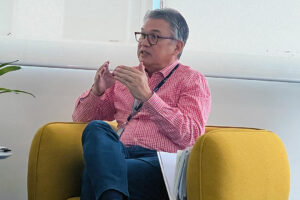
How First Gen is expanding its portfolio to meet PHL’s power demand
and Chief Operating Officer Francis Giles B. Puno
By Sheldeen Joy Talavera, Reporter
FIRST GEN Corp. is diversifying its energy portfolio to meet the Philippines’ power demand, with a strong focus on renewable energy sources like geothermal and solar.
“We’ve been in the business for quite a long time, and so, over the years, our priorities have always adjusted,” First Gen President and Chief Operating Officer Francis Giles B. Puno said in an interview with BusinessWorld.
“And of course, one of our big priorities is climate change. Part of our advocacy in climate change is to really promote renewable energy,” he added.
First Gen is a holding company for the power generation and energy-related businesses of the listed conglomerate First Philippine Holdings Corp.
The company has a total of 3,668 megawatts (MW) of installed capacity from its portfolio of plants that run on geothermal, wind, hydro, solar energy, and natural gas.
“Many of our investments were originally in fossil fuels, particularly gas. We never invested in coal. But over the last many years, our priority has been in geothermal,” Mr. Puno said.
“Hopefully, we will be able to deliver more capacity next year — to deliver more 24-hour baseload renewable energy to our consumers,” he said.
For 2025, the company has set a lower capital expenditure (capex) budget amounting to P35 billion, of which 90% will be allocated to its renewable energy subsidiary Energy Development Corp.’s drilling activities and growth projects.
First Gen has set a P60-billion capex program, of which P30 billion is for drilling wells and another P30 billion for building more geothermal power facilities, as well as battery energy storage facilities.
“We’re spending a lot on our well drilling program. But the other issue we’re facing is that our power plants above ground are quite old already,” he said. “So, we’re also trying to figure out how to make sure that we’re maximizing the steam capability of concessions matched with the right technology.”
First Gen has set a goal to expand its solar energy portfolio, with a portion of its capex allotted for the development of a 50-MW solar facility in Batangas.
“Right now, we’re hoping that we can build our largest solar investment, which will be 50 MW, and that will be the springboard for more solar expansion of the First Gen Group moving ahead,” Mr. Puno said.
As the Philippines aims to shift to renewable energy, First Gen is banking on liquefied natural gas (LNG) as a transition fuel.
Currently, the company is integrating LNG with Malampaya natural gas for its gas-fired power plants.
“We’re also trying to transition from full Malampaya operations to partly Malampaya, partly LNG,” Mr. Puno said.
“Because Malampaya is running out and is no longer sufficient to deliver all of our gas-fired power needs, we needed to bring in LNG,” he added.
First Gen has four existing gas-fired power plants with a combined capacity of 2,017 MW in the First Gen Clean Energy Complex in Batangas.
Its subsidiary, FGEN LNG Corp., constructed an interim offshore LNG terminal and executed a five-year time charter party for BW Batangas to provide LNG storage and regasification services.
Mr. Puno said that proper implementation of policies is needed as the country is going through “a very critical phase,” especially to address the feasibility of LNG for the country’s energy security.
“We have to be more proactive in making good policies and regulations, but also to provide incentives for investors so we can bring in more investments,” he said.
“If they do it wrong, then it will reduce the attractiveness for us to make those investments,” he added.
